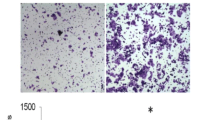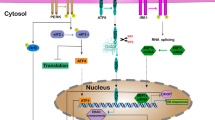Abstract
Glucose-regulated protein 78 (GRP78) has been implicated in the protection of tumor cells from cytotoxic damage and apoptosis and thus assists cells in survival under oxygen-deprivation and nutrient-stress conditions. However, its expression and potential role in gastric cancer development and progression have not been reported. In the present study, we determined the level of GRP78 expression in the primary tumor in 86 cases of resected gastric cancer by using immunohistochemistry and analyzed the relationships between GRP78 and clinicopathological characteristics. We found that GRP78 was overexpressed in the tumor specimens when compared with the expression in adjacent tumor-free gastric mucosa. Furthermore, the level of GRP78 expression in both primary tumors and metastatic lymph nodes was inversely correlated with patient survival. Overexpression of GRP78 was directly correlated with Sp1 expression and increased lymph node metastasis. Knocking down GRP78 expression inhibited tumor cell invasion in vitro and growth and metastasis in a xenograft nude mouse model. Therefore, our data imply that dysregulated expression of GRP78 may contribute to the development and progression of gastric cancer.



Similar content being viewed by others
References
Parkin DM, Bray F, Ferlay J, Pisani P (2005) Global cancer statistics, 2002. CA Cancer J Clin 55:74–108
Berardi R, Scartozzi M, Romagnoli E, Antognoli S, Cascinu S (2004) Gastric cancer treatment: a systematic review. Oncol Rep 11:911–916
Hofler H, Becker KF (2003) Molecular mechanisms of carcinogenesis in gastric cancer. Recent Results Cancer Res 162:65–72
Zheng L, Wang L, Ajani J, Xie K (2004) Molecular basis of gastric cancer development and progression. Gastric Cancer 7:61–77
Gething MJ (1999) Role and regulation of the ER chaperone BiP. Semin Cell Dev Biol 10:465–472
Liu H, Miller E, van de Water B, Stevens JL (1998) Endoplasmic reticulum stress proteins block oxidant-induced Ca2+ increases and cell death. J Biol Chem 273:12858–12862
Little E, Ramakrishnan M, Roy B, Gazit G, Lee AS (1994) The glucose-regulated proteins (GRP78 and GRP94): functions, gene regulation, and applications. Crit Rev Eukaryot Ggene Expr 4:1–18
Jamora C, Dennert G, Lee AS (1996) Inhibition of tumor progression by suppression of stress protein GRP78/BiP induction in fibrosarcoma B/C10ME. Proc Natl Acad Sci USA 93:7690–7694
Reddy RK, Lu J, Lee AS (1999) The endoplasmic reticulum chaperone glycoprotein GRP94 with Ca(2+)-binding and antiapoptotic properties is a novel proteolytic target of calpain during etoposide-induced apoptosis. J Biol Chem 274:28476–28483
Bernstein H, Payne CM, Bernstein C, Schneider J, Beard SE, Crowley CL (1999) Activation of the promoters of genes associated with DNA damage, oxidative stress, ER stress and protein malfolding by the bile salt, deoxycholate. Toxicol Lett 108:37–46
McCormick TS, McColl KS, Distelhorst CW (1997) Mouse lymphoma cells destined to undergo apoptosis in response to thapsigargin treatment fail to generate a calcium-mediated grp78/grp94 stress response. J Biol Chem 272:6087–6092
Reddy RK, Mao C, Baumeister P, Austin RC, Kaufman RJ, Lee AS (2003) Endoplasmic reticulum chaperone protein GRP78 protects cells from apoptosis induced by topoisomerase inhibitors: role of ATP binding site in suppression of caspase-7 activation. J Biol Chem 278:20915–20924
Koomagi R, Mattern J, Volm M (1999) Glucose-related protein (GRP78) and its relationship to the drug-resistance proteins P170, GST-pi, LRP56 and angiogenesis in non-small cell lung carcinomas. Anticancer Res 19:4333–4336
Fernandez PM, Tabbara SO, Jacobs LK, et al (2000) Overexpression of the glucose-regulated stress gene GRP78 in malignant but not benign human breast lesions. Breast Cancer Res Treat 59:15–26
Uramoto H, Sugio K, Oyama T, et al (2005) Expression of endoplasmic reticulum molecular chaperone Grp78 in human lung cancer and its clinical significance. Lung Cancer 49:55–62
Koong AC, Chen EY, Lee AS, Brown JM, Giaccia AJ (1994) Increased cytotoxicity of chronic hypoxic cells by molecular inhibition of GRP78 induction. Int J Radiat Oncol Biol Phys 28:661–666
Wang L, Wei D, Huang S, et al (2003) Transcription factor Sp1 expression is a significant predictor of survival in human gastric cancer. Clin Cancer Res 9:6371–6380
Abdelrahim M, Samudio I, Smith R III, Burghardt R, Safe S (2002) Small inhibitory RNA duplexes for Sp1 mRNA block basal and estrogen-induced gene expression and cell cycle progression in MCF-7 breast cancer cells. J Biol Chem 277:28815–28822
Bond GL, Hu W, Levine A (2005) A single nucleotide polymorphism in the MDM2 gene: from a molecular and cellular explanation to clinical effect. Cancer Res 65:5481–5484
Zu K, Bihani T, Lin A, et al (2006) Enhanced selenium effect on growth arrest by BiP/GRP78 knockdown in p53-null human prostate cancer cells. Oncogene 25:546–554
Dong D, Ko B, Baumeister P, et al (2005) Vascular targeting and antiangiogenesis agents induce drug resistance effector GRP78 within the tumor microenvironment. Cancer Res 65:5785–5791
Huang S, Mills L, Mian B, et al (2002) Fully humanized neutralizing antibodies to interleukin-8 (ABX-IL8) inhibit angiogenesis, tumor growth, and metastasis of human melanoma. Am J Pathol 161:125–134
Wei D, Gong W, Kanai M, et al (2005) Drastic down-regulation of Kruppel-like factor 4 expression is critical in human gastric cancer development and progression. Cancer Res 65:2746–2754
Luo S, Baumeister P, Yang S, Abcouwer SF, Lee AS (2003) Induction of Grp78/BiP by translational block: activation of the Grp78 promoter by ATF4 through and upstream ATF/CRE site independent of the endoplasmic reticulum stress elements. J Biol Chem 278:37375–37385
Cho DY, Yang GH, Ryu CJ, Hong HJ (2003) Molecular chaperone GRP78/BiP interacts with the large surface protein of hepatitis B virus in vitro and in vivo. J Virol 77:2784–2788
Moennikes O, Loeppen S, Buchmann A, et al (2004) A constitutively active dioxin/aryl hydrocarbon receptor promotes hepatocarcinogenesis in mice. Cancer Res 64:4707–4710
Hori O, Matsumoto M, Kuwabara K, et al (1996) Exposure of astrocytes to hypoxia/reoxygenation enhances expression of glucose-regulated protein 78 facilitating astrocyte release of the neuroprotective cytokine interleukin 6. J Neurochem 66:973–979
Jacquier-Sarlin MR, Dreher D, Polla BS (1996) Selective induction of the glucose-regulated protein grp78 in human monocytes by bacterial extracts (OM-85): a role for calcium as second messenger. Biochem Biophys Res Commun 226:166–171
Abdelrahim M, Liu S, Safe S (2005) Induction of endoplasmic reticulum-induced stress genes in Panc-1 pancreatic cancer cells is dependent on Sp proteins. J Biol Chem 280:16508–16513
Lim SO, Park SG, Yoo JH, et al (2005) Expression of heat shock proteins (HSP27, HSP60, HSP70, HSP90, GRP78, GRP94) in hepatitis B virus-related hepatocellular carcinomas and dysplastic nodules. World J Gastroenterol 11:2072–2079
Hsu WM, Hsieh FJ, Jeng YM, et al (2005) GRP78 expression correlates with histologic differentiation and favorable prognosis in neuroblastic tumors. Int J Cancer 113:920–927
Sugawara S, Takeda K, Lee A, Dennert G (1993) Suppression of stress protein GRP78 induction in tumor B/C10ME eliminates resistance to cell mediated cytotoxicity. Cancer Res 53:6001–6005
Dorner AJ, Wasley LC, Kaufman RJ (1992) Overexpression of GRP78 mitigates stress induction of glucose regulated proteins and blocks secretion of selective proteins in Chinese hamster ovary cells. EMBO J 11:1563–1571
Chatterjee S, Cheng MF, Berger SJ, Berger NA (1994) Induction of M(r) 78,000 glucose-regulated stress protein in poly(adenosine diphosphate-ribose) polymerase- and nicotinamide adenine dinucleotide-deficient V79 cell lines and its relation to resistance to the topoisomerase II inhibitor etoposide. Cancer Res 54:4405–4411
Gomer CJ, Ferrario A, Rucker N, Wong S, Lee AS (1991) Glucose regulated protein induction and cellular resistance to oxidative stress mediated by porphyrin photosensitization. Cancer Res 51:6574–6579
Courey AJ, Tjian R (1992) Mechanisms of transcription factor Sp1. In: von Hippel H, Yager TD, Gill SC (eds) Transcription regulation. Cold Spring Harbor, NY, Cold Spring Harbor Laboratory Press, pp 743–769
Acknowledgments
We thank Emily Karotkin for preparation of this manuscript and Don Norwood for editorial comments. This work was supported in part by Research Scholar Grant CSM-106640 from the American Cancer Society and Grant 1R01-CA093829 from the National Cancer Institute (K. Xie) and Grant 1R01-GM69967 from the National Institute of General Medical Sciences (S. Fang), National Institutes of Health.
Author information
Authors and Affiliations
Corresponding author
Rights and permissions
About this article
Cite this article
Zhang, J., Jiang, Y., Jia, Z. et al. Association of elevated GRP78 expression with increased lymph node metastasis and poor prognosis in patients with gastric cancer. Clin Exp Metastasis 23, 401–410 (2006). https://doi.org/10.1007/s10585-006-9051-9
Received:
Accepted:
Published:
Issue Date:
DOI: https://doi.org/10.1007/s10585-006-9051-9




